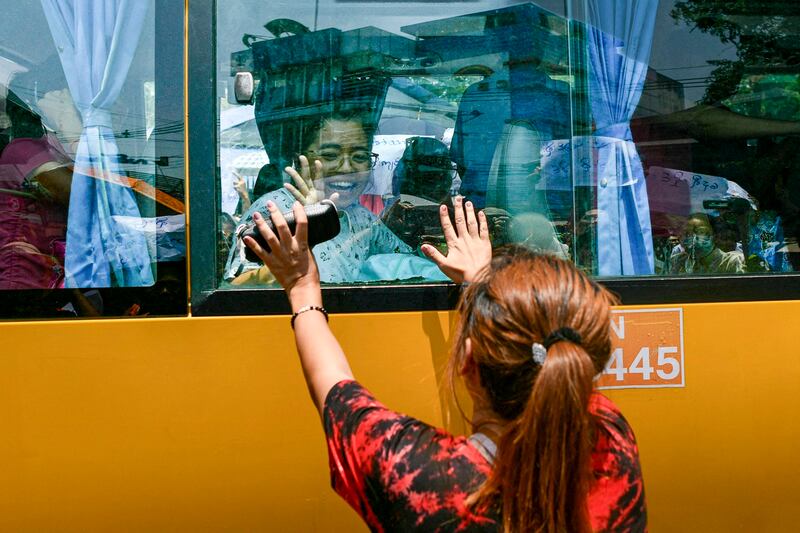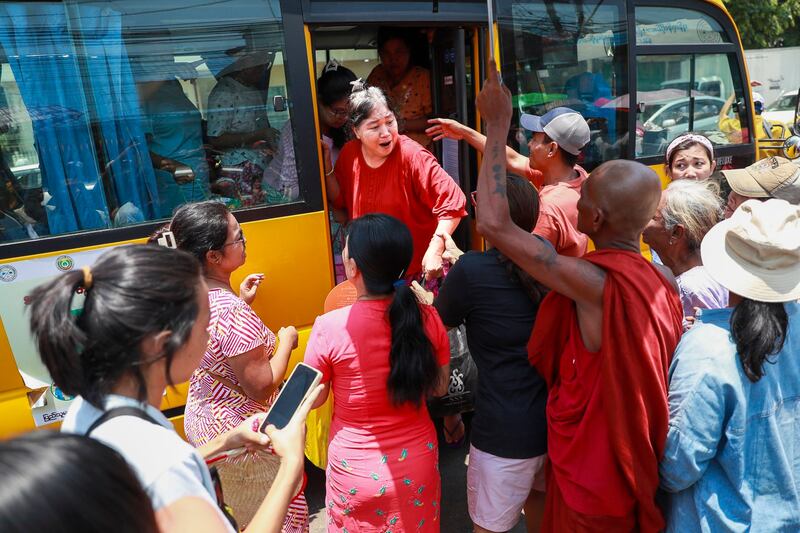Myanmar’s junta has killed more than 900 women and arrested nearly 5,000 others in just over three years since the military seized power in a coup d’etat, a political prisoner watchdog group said Tuesday.
Shortly after the Feb. 1, 2021, coup, tens of thousands of civilians took to the streets of Myanmar to protest – many of whom were women. The junta responded with violent and sometimes deadly force, before launching a scorched earth offensive against rebel groups around the country.
On Tuesday, the Assistance Association of Political Prisoners (Burma), or AAPP, said in a statement that it had documented the junta’s killing of at least 929 women between the coup and May 6, 2024, accounting for nearly one in five of the 4,973 people killed since the takeover.
The AAPP said that the junta arrested at least 4,778 women over the same period, making up 18% of the total 26,631 people arrested since the coup.
Of the women arrested, at least 781 have been sentenced to prison, Naw Khin San Htwe, the secretary general of the Burmese Women’s Union, told RFA Burmese.
In March last year, Myanmar’s shadow National Unity Government said that the junta had killed 483 women in the 25 months since the coup and detained 3,125 others.
The AAPP said Tuesday that the number of those killed and arrested is “likely much higher,” noting that it only tallied the deaths and arrests it had been able to verify.
One woman’s case
In one of the latest examples of women arrested and sentenced since the coup, a junta court last month found Lwin Cho Myint, the former general secretary of the Student Union of the University of Technology in Sagaing region, guilty of violating the country’s anti-terrorism law and ordered that she spend 17 years in prison.
A family member called her arrest and imprisonment “arbitrary” in an interview with RFA.
"The junta is unjustly detaining and imprisoning anyone who dissents against them, fabricating charges to justify their actions,” said the family member, who spoke on condition of anonymity due to security concerns.
“Such imprisonment under false pretenses amounts to oppression,” the family member said. “The more repression, the stronger the revolution. If the repression increases, there will be uprisings all over the country.”
In a more high profile case, on Jan. 10, a court in Yangon region's notorious Insein Prison sentenced documentary filmmaker Shin Daewe to life in prison after finding her guilty on two counts of terrorism.
Heavy punishments for dissenters
Zu Zu May Yoon, the founder of the AAPP, told RFA that the junta regularly imposes heavy punishments on anyone who opposes its rule.
"Following the coup, there were instances of political prisoners being condemned to death without anything made public,” she said, noting that even minor infractions under martial law incur a minimum sentence of 10 years in prison.
“During my time there [in prison], people sentenced to death, life imprisonment, or lengthy terms were all confined within the same penitentiary,” she said. “They were isolated from contact with anyone else and endured severe living conditions.”

AAPP said it had documented several young women who were shot dead during peaceful protests in the aftermath of the coup or died under suspicious circumstances while in custody.
Among those killed during peaceful protests were Kyal Sin and Mya Thwet Thwet Khaing, aged between 19 and 20, who were shot dead by junta police at demonstrations in Mandalay and Naypyidaw in February 2021.
Nobel Aye, a former political prisoner who was arrested and held at a detention center in eastern Bago region, was shot and killed by junta soldiers on the pretext that she had escaped from the courthouse in Waw township on Feb. 8, 2024.
Nobel Aye’s brother Chan Myae said that he wanted justice for the killing.
"We want to regain our lost human rights and get justice for the torture and killings,” he said. “I strongly protest the widespread violation of women’s rights in Myanmar, encompassing not only my sister but all women, by the [junta] forces that have seized power."
Violent deaths on the rise for women
The Burmese Women's Union’s Naw Khin San Htwe, told RFA that since the coup, women in Myanmar have been killed in increasingly violent ways.
"If you look at the circumstances of the deaths, most of them died due to airstrikes, landmines, and heavy weaponry,” she said. “In addition, some were raped and murdered. Moreover, women have succumbed during interrogations, while others have been fatally shot in wartime conflicts."

RFA has documented several cases of women taking up arms alongside men on the frontlines of the war against the junta, saying they could no longer tolerate the unlawful killings and arrests of their gender.
One former nurse who joined the Civil Disobedience Movement of civil servants boycotting the junta now provides medical aid to injured rebels on the frontline.
The former nurse, who also declined to be named citing fear of reprisal, told RFA that women are regularly subjected to sexual violence in detention, even if it does not escalate to rape.
"They [the junta] transgress numerous human rights against women, perpetrating relentless violence,” she said. “Thus, I am compelled to persevere until the very end, aspiring to be the final torchbearer of resistance for my generation. My commitment remains steadfast to eradicate this scourge from our midst."
Translated by Kalyar Lwin. Edited by Joshua Lipes and Malcolm Foster.
